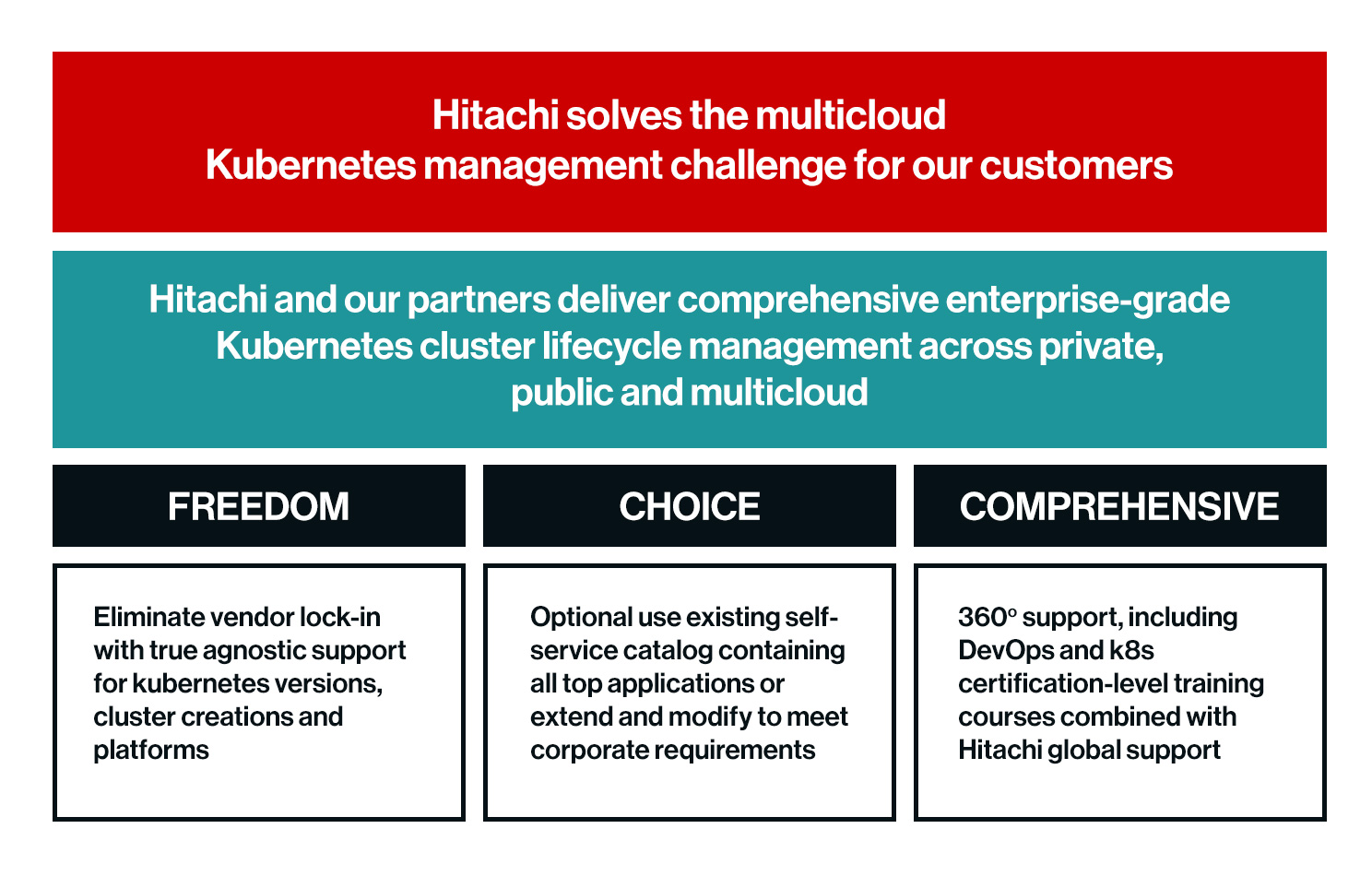Hitachi Solves the Hybrid, Multicloud Management Challenge for Kubernetes


A more agile and efficient infrastructure is key to realizing the cost savings and productivity gains businesses needed to succeed in today’s highly competitive market. Recent surveys by Roger Magoulas & Steve Sawyer, May 19, 2020, show that 88% of enterprises are currently using cloud in some form or another. This adoption is not surprising as clouds have been around now for several decades since Amazon Web Services (AWS) was launched in 2002. What may be surprising is that 86% of IT organizations are prioritizing containers for more applications, and much of that is occurring in the cloud or clouds as customers move to multicloud environments. The use of containers has been exploding since their introduction by Docker in 2013. IT and application users are looking at containers to support new use cases and performant workloads to win, serve and retain customers. The explosion in the use of containers in such a short time has created management challenges, especially since it requires different skill sets and architectures from the development of traditional monolithic applications.
Kubernetes has become the acknowledged de facto standard for container creation, orchestration and management. However, Kubernetes has different flavors, depending on who is providing it. Different Kubernetes vendors include proprietary enhancements to ensure vendor lock-in. Cloud vendors like AWS, Microsoft Azure and Google provide managed Kubernetes services. Cloud vendors have even begun to offer Kubernetes-based hybrid-cloud solutions to extend their reach into the enterprise. VMware has also committed to its own Kubernetes management to offer enterprises the ability to take advantage of cloud-like capabilities of cloud-native deployments in their on-premises environments. Having so many flavors of Kubernetes creates its own management problems.
The perception is that Kubernetes is cheap and easy. The reality is somewhat different. It requires a wide range of highly complex tasks, especially when implementing Kubernetes in multiple clouds with multiple clusters. Kubernetes is a suite of different tools, many of which are developed by the open community. Orchestrating and managing these different tools requires addressing availability and protection, infrastructure performance, security, resource planning, monitoring, alerting and reporting, and skills development.
Hitachi Kubernetes Service is an open hybrid and multicloud management service for enterprise-grade Kubernetes implementations. It delivers a very reliable service for consistent deployment, management and monitoring of Kubernetes clusters on premises and across all major cloud providers, with enterprise grade security and governance. Hitachi partners closely with public cloud providers to ensure that Hitachi Kubernetes Service complements what they natively offer. By providing a multicloud management environment, Hitachi reduces complexity and enables choice in selecting the right solution for each environment, without inhibiting the innovation provided by the public cloud providers.
Hitachi Kubernetes Services incudes Cloud Native Computing Foundation (CNCF) certified distribution engine, Hitachi Kubernetes Engine, and a Kubernetes management service, Hitachi Kubernetes Service.
Kubernetes, also known as K8s, is not a single application; it’s a suite of different applications and tools and it comes with no installation wizard or auto-configuration script. Hitachi Kubernetes Engine is a software distribution package that provides a pre-built version of Kubernetes with seamless one-click upgrade process across all Kubernetes clusters. It is CNCF certified, which ensures that every vendor’s version of Kubernetes supports the required APIs, as do open-source community versions. Conformance ensures consistency and timely updates. To remain certified, vendors need to provide the latest version of Kubernetes yearly or more frequently, so you can be sure that you’ll always have access to the latest features the community has been working hard to deliver. The Hitachi Kubernetes Engine’s automated management means low overhead for operations teams.
Hitachi Kubernetes Service is a hybrid, multicloud management Kubernetes service. It enables you to deploy, manage and monitor enterprise-grade Kubernetes clusters. It provides centralized control and operates with consistency across all major cloud providers and on premises. It has an intuitive and unified dashboard for operators, developers and power users.

With the cloud-agnostic Hitachi Kubernetes Service, you can optimize the placements of your applications where you need them. Different public and private clouds have distinct strengths and weaknesses. This service lets you always put your apps where you want them, when you need them, alleviating lock-in concerns. Our agnostic, hybrid and multicloud solution enables you to modernize your existing applications and build new ones. It will deliver reliable services for the deployment, management and monitoring of enterprise-grade Kubernetes clusters across all major cloud providers.
Get more information on Hitachi Kubernetes Service here.
Hu Yoshida is CTO Emeritus at Hitachi Vantara.

Hu Yoshida spent 24 years at Hitachi Vantara helping define technical direction and enabling customers to address their digital transformation needs. He is widely known in the industry and was instrumental in evangelizing Hitachi's unique approach to storage virtualization.